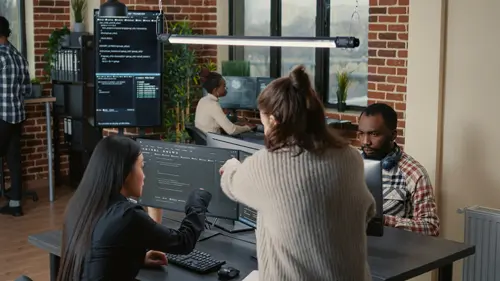Sawah Cyber Security uses Static Application Security Testing (SAST) tooling and manually code reviews by our experts to analyse the application source code. We use SAST tooling to developers writing safer code and reducing risks.

Sawah Cyber Security uses Static Application Security Testing (SAST) tooling and manually code reviews by our experts to analyse the application source code. We use SAST tooling to developers writing safer code and reducing risks.
Our Code Review Assessment goes beyond tradditional code reviews. We focus on identifying vulnerabilities and weaknesses deeply embedded in your code, including issues like input validation, library vulnerabilities and flaws in application logic.
In addition to a traditional code review, not only the source code will be reviewed. In our methodology and approach we combine this with practically testing the vulnerability on a live (staging), environment to determine the actual impact with a risk base approach.
Whether your system is built on a monolithic or microservice (SOA) architecture, we thoroughly analyze the source code to uncover to potential risks.

We don’t just offer a one-time code review – We become a virtual member of your development team, providing continuous security assessments as your code evolves. Whether you team works traditionally, Agile or Scrum based, we tailor our solution to your needs.
Our goal is to work alongside your team on a long-term basis, reviewing every code commit, looking for potential vulnerabilities and weaknesses. This proactive approach ensures your code remains secure throughout the development lifecycle, going from a traditional Software Development Life Cycle (SDLC) to a Secure SDLC (S-SDLC).
Our security experts seamlessly integrate into your workflow. Whether your team uses GitLab, GitHub, or chat collaboration tools like Slack or Microsoft Teams, we provide real-time feedback directly within the tools you already use. Every code commit is thoroughly reviewed, and risk-based insights are delivered quickly, ensuring your team can act immediately on security recommendations.
With us as part of your development team, you focus on developing code and we focus on security and giving your team the feedback it needs to continuously improve writing better code.
Our Code Review Assessment goes beyond tradditional code reviews. We focus on identifying vulnerabilities and weaknesses deeply embedded in your code, including issues like input validation, library vulnerabilities and flaws in application logic.
In addition to a traditional code review, not only the source code will be reviewed. In our methodology and approach we combine this with practically testing the vulnerability on a live (staging), environment to determine the actual impact with a risk base approach.
Whether your system is built on a monolithic or microservice (SOA) architecture, we thoroughly analyze the source code to uncover to potential risks.
We don’t just offer a one-time code review – We become a virtual member of your development team, providing continous security assessments as your code evolves. Whether you team works traditionally, Agile or Scrum based, we tailor our solution to your needs.
Our goal is to work alongside your team on a long-term basis, reviewing every code commit, looking for potential vulnerabilities and weaknesses. This proactive approach ensures your code remains secure throughout the development lifecycle, going from a traditional Software Development Life Cycle (SDLC) to a Secure SDLC (S-SDLC).
Our security experts seamlessly integrate into your workflow. Whether your team uses GitLab, GitHub, or chat collaboration tools like Slack or Microsoft Teams, we provide real-time feedback directly within the tools you already use. Every code commit is thoroughly reviewed, and risk-based insights are delivered quickly, ensuring your team can act immediately on security recommendations.
With us as part of your development team, you focus on developing code and we focus on security and giving your team the feedback it needs to continuously improve writing better code.
*By submitting this form you agree to the Website Terms of Use, consent to be contacted by Sawah Cybersecurity and its partners, and acknowledge the Privacy Notice.